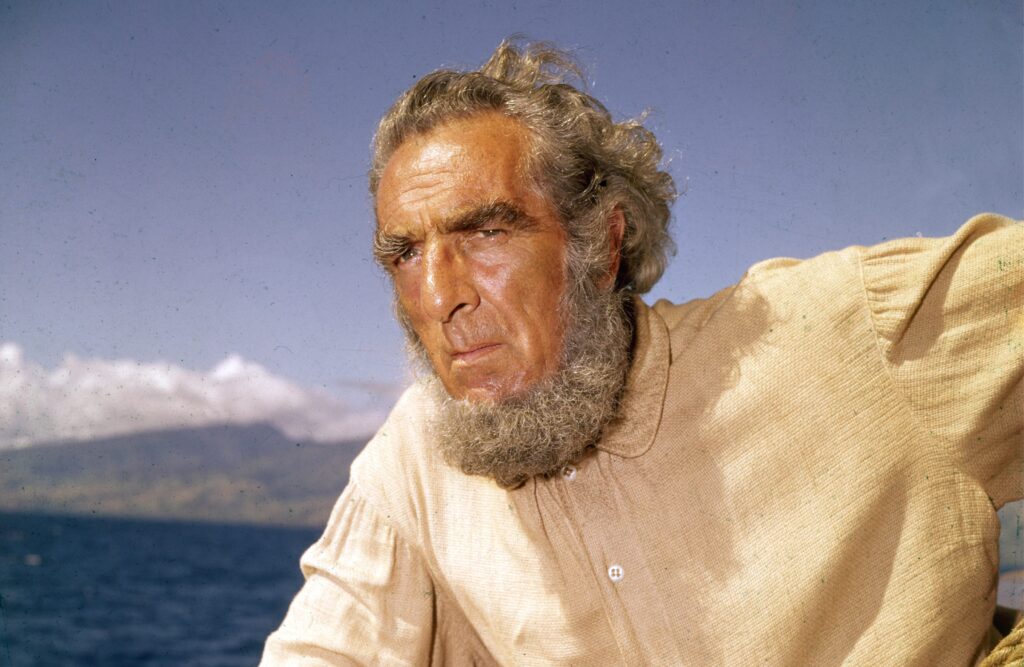By Ivor Casey
With his mixture of humour and comic timing, combined with his ability to take on more serious and dramatic roles, Noel Purcell made his mark as an accomplished character actor; he was also noted for his work in pantomimes and for his appearances on the silver screen. He first began acting as a child in Dublin and eventually made his way to London and Hollywood, starring in a selection of popular movies, including Moby Dick (1956) and Mutiny on the Bounty (1962).
This year marks the 40th anniversary of the Irish star’s death. He was born Joseph Patrick Noel Purcell on 23 December 1900 at 11a Lower Mercier Street, Dublin. He was the first of two sons born to Catherine Hoban, an antique dealer, and Pierce Purcell, an auctioneer. Around the age of twelve Noel took up working after school hours at the Gaiety Theatre. He received occasional walk-on parts and became acquainted with the theatre business, paving the way for his future endeavours.

He finished school at sixteen and got a job as a carpenter at a shop-fitting company, but he continued to take on acting roles at different theatres in Dublin and became very involved in pantomimes. His career escalated from 1929 onwards when he joined the recently formed O’D Company, a variety production company which focused on writing and performing, set up by Dublin’s comic actor Jimmy O’Dea and producer and writer Harry O’Donovan. This vaudeville company toured Ireland and the UK, and Noel became further immersed in the world of show business with productions such as Laugh Irish and Irish Smiles at venues such as the Royal Hippodrome in London.
The Olympia Theatre on Dame Street in Dublin hosted the company’s annual pantomime, and throughout the 1930s Purcell established himself as a popular pantomime ‘dame’, greatly entertaining and amusing his audiences over the years. It was also with the O’D Company that Noel made his début movie, appearing in the comedy Jimmy Boy (1935). He soon parted ways with the O’D Company and sought work further afield, gaining employment in the Theatre Royal as well as continuing to act at the Gaiety Theatre in plays such as Seán O’Casey’s Juno and the Paycock, The Silver Tassie and Red Roses for Me. However, the expanding film industry provided a new regular platform for Purcell and he began to be offered more movie roles. He got a small part as a tram conductor in the Carol Reed drama Odd Man Out (1947), set in Belfast, and he soon followed with the larger role of Daniel McGinty in the Irish political drama Captain Boycott (1947).
More work came his way, such as The Blue Lagoon (1949), based on the novel by Dún Laoghaire-born writer Henry de Vere Stacpoole. His next several movies were comedies with Irish themes and settings, including Saints and Sinners (1949), filmed in County Louth. He was chosen for a range of historical dramas and adventures and was often cast as a rugged seafaring character, such as in the classic Moby Dick (1956), filmed in Youghal.
Purcell crossed between Ireland, Britain and Hollywood taking up work but Ireland remained his home; he even turned down a Hollywood contract as it meant staying away from Ireland for too long. Shake Hands with the Devil (1959), set during the Irish War of Independence, led into a slew of film roles in the 1960s, working on dramas, comedies and adventures with the likes of Orson Welles, Peter Sellers and Marlon Brando, with whom he appeared in the classic Mutiny on the Bounty (1962).
One of his later movies was the Irish-based Flight of the Doves (1971), but after many years of making movies and guest appearances on TV series such as The Saint and The Avengers Noel retired from screen acting in 1973. He continued to make stage appearances, including a performance as the Cardinal in Puccini’s Tosca at the Gaiety in 1982. He made one final TV appearance in 1984 in the series The Irish R.M. In addition, he had gained some recognition as a singer for his rendering of Leo Maguire’s ‘The Dublin Saunter’ (‘Dublin can be heaven …’), which, surprisingly, was not a hit when first released in the 1940s, given its countless airplays on radio in subsequent decades.
Finally, at the age of 84, after a lengthy career of performances on stage, radio, film and TV, Noel Purcell died on 3 March 1985. He was survived by his wife, Eileen Marmion, and their four sons. Prior to his death he was recognised for his contribution to the arts with the honour of the Freedom of the City of Dublin.
Ivor Casey is a freelance journalist of history and the arts and author of Elvis and Ireland (Appello Press, 2013).
